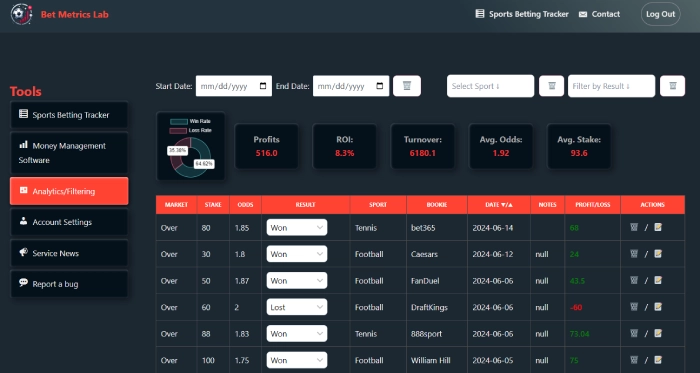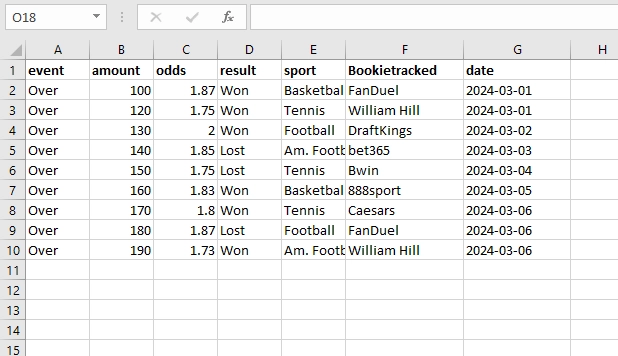Sports Betting Spreadsheet App or Excel SpreadSheet?
I have used both Excel and custom-made apps to track and analyze my bets. Both approaches have advantages and downsides when it comes to time investment, complexity, and price.
Most bettors try the free solution of tracking bets with Excel, but for many of us, there are apps that offer additional features worthy even for paying a small monthly fee.
What is the goal of a betting spreadsheet?
In my experience, the main goal of a betting spreadsheet is to track bets placed at multiple bookies on a single platform.
While most bettors use them for only tracking purposes, many spreadsheets have other helpful features that help analyze your betting history.
1. Have a general overview of your profitability
When using multiple sportsbooks and taking advantage of many bonuses, bettors can easily lose track of bets and account balances.
A betting spreadsheet helps you track unsettled bets, and accounts that still have bonus offers available.
A bet tracking method is not important for bettors who are using a single bookmaker. In that case, you can always easily know the profitability by just checking your betting history or balance.
However, using a spreadsheet becomes handy when you have 3+ betting accounts and want to know your monthly/weekly profitability.
2. Manage your betting balance
A well-designed and built spreadsheet can help you avoid running out of funds on important accounts.
Many strategies such as value betting, arbitrage betting, or matched betting require the right distribution of funds.
Applying simple filters on a spreadsheet or a betting tracking app will help you understand which bookie will require more funds shortly.
Below, you can find the free bet tracking app developed by BetMetricsLab.

3. Analyze the profitability of bet types
The most important goal of tracking your bets with a spreadsheet shows itself when you want to analyze your betting history.
This step will require a few hundred bets to be truly effective. However, using a bet tracking app is one of the most effective ways of excluding future mistakes.
Using simple filters for markets, bookies, odds ranges, sports, or leagues will reveal the weaknesses of your strategy.
When I was struggling with my basketball betting strategy, I built a betting history of only ~200 bets. After using a few filters and calculations I was able to spot the league that was generating a significant loss.
The small change of avoiding this league changed my profitability from one day to another.
4. Fine-tune your strategy
When a betting strategy is already profitable, you can easily forget the possibility of getting it better.
Once I built a betting history with my tennis bets where I was satisfied with the results.
After applying a few filters to the spreadsheet and calculating the ROI of each tournament I noticed something important.
My bet tracking method helped me find out that I investing too much time into a tournament type and stage of the tournaments where the ROI was barely over 1%.
This betting spreadsheet made me realize that I’m wasting expensive hours on these events for almost nothing, while others generated multiple times more profits.
Excel betting spreadsheet template example to use on BetMetricsLab
Here at Bet Metrics Lab, you can track your bets based on many inputs such as odds, stake, bookie used, market, and many more.
You have two main approaches when it comes to tracking your bets at our site. You can either log each bet individually or import your already existing betting history.
The Excel betting spreadsheet you need to upload to our site needs to have specific columns with the right naming convention.

- The file must be in .xls or .xlsx format
- It must follow the column header naming of the example file
- You need to have each column present, even if you have no data for it
- Make sure the date column is in text format and/or it has the YYYY-MM-DD date format
- You need to use decimal or American odds format and select/save the desired odds format in the Account Setting before uploading your file.
- You can use the following Microsoft Excel betting spreadsheet template to upload your betting history:
Can you use BetMetricsLab as a matched betting spreadsheet?
While Bet Metrics Lab is not focusing on being a bet-tracking app for matched bettors, it can be used as one.
It does not allow automatic tracking of your bets, but it has the majority of input fields that a matched bettor needs to track.
What formulas are included in the betting spreadsheet and filtering?
At Bet Metrics Lab you can find various formulas included to automate calculations and provide insightful data analysis.
Here are some key formulas included in the betting spreadsheet:
Profit/Loss Ratio:
This formula calculates the profit or loss for each bet based on the result logged by you. It also calculates their ratio based on the filters you applied.
Total Profit/Loss:
You can apply many filters and the spreadsheet will display the total profits or losses for that period, sport, or odds ranges.
Return on Investment (ROI):
ROI is also calculated for every possible filter, including odds ranges. This spreadsheet data is also visualized, so you can easily spot which odds ranges are not performing well.
Average Odds & Stakes:
Knowing the average odds and stakes for certain bet types becomes important when you need a risk analysis.
Both factors tracked in a spreadsheet have high importance when you need to know the possible effect of a long-lasting variance.
Bankroll Tracking & Simulations:
At Bet Metrics Lab you can find different types of staking simulations based on your betting history. This data will help you understand which approach has the highest possibility of generating the most profits in the long run.
The role of betting spreadsheets is undervalued by many bettors who haven’t had access to such tools.
A simple change such as using a smaller percentage of your actual balance can protect you from losing everything.
What are the limitations and downsides of a betting tracker?
Besides the significant advantages, bet tracking spreadsheets have some downsides such as additional data entry errors, the time-consuming process, and the reliance on third-party tools.
The majority of betting spreadsheets and bet tracker software rely on bettors inserting data manually. This process will most likely result in some or many mistakes such as logging bets with slightly wrong odds, markets, or even the correct result of the event.
While some services can pull betting history from certain bookie accounts, in most cases bettors will need to process bets one by one.
This downside of betting spreadsheets can lead to filtering, analysis, and strategy-related conclusions made in error.
Smaller data entry mistakes don’t have a big impact on larger data samples. However not paying attention and inserting many wrong info will distort the results and the effectiveness of many features a bet tracker can offer.
In my experience, the second biggest downside comes from the lack of automation. Bettors need to log each bet one by one, open bookie accounts, and update the bets when they are concluded.
This multi-step process can take up even a minute per bet in some cases. While automation is available at some bet tracking services, they cover only a few bookies.
Is using an Excel spreadsheet better than an app?
The debate between using an Excel spreadsheet or an app for tracking your bets is a long-lasting one.
Many bettors with a limited budget would argue until the end of the universe that using Excel or a Google spreadsheet is better.
While bettors who chose to use paid or free bet-tracking apps seem to be satisfied with the services.
Both Excel spreadsheets and online bet-tracking apps have their advantages and downsides. Each solution will attract different types of bettors.
Advantages of using an Excel Spreadsheet for bet tracking:
An Excel spreadsheet is empty when you are starting, so you can include input data, formulas, and graphs as you like.
Tracking bet history in Excel is free and it offers flexibility for customization. For someone with a small budget, this solution is the starting and also the finishing point.
For someone with decent skills in Excel, building formulas, tables, and graphs won’t take too long.
However, a betting spreadsheet in Google Sheets or Excel can need serious time investment if you don’t have a basic knowledge of how to calculate certain profitability metrics.
One of the main advantages of tracking your bets with this solution is accessibility. You can check your data offline and you can transfer it from one device to another.
You bet history remains private (if this is important to you).
Advantages of Using a Bet Tracking App:
One of the major advantages of using a third-party app for tracking your bets is the ease of use. You don’t have to build a spreadsheet with tens of formulas and the implementation of graphs.
Most online apps will require you to insert the essential data about the bet and after logging the bet, statistics and graphs are refreshed.
Another important advantage of such services is the additional features that most average bettors won’t include in a simple Excel spreadsheet.
As an example, money management simulations, bet analysis based on filters, and many more.
Some bet tracking apps have the feature of providing predictions, in-depth statistics about future events and even back-testing your strategy.
Each of these services should be used with precaution because we don’t have direct access to the methods they use.
